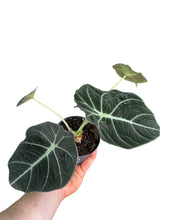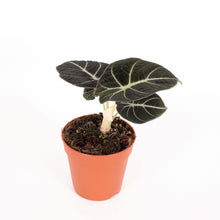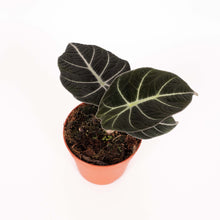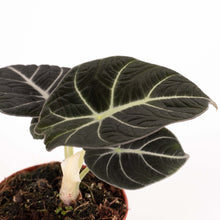Alocasia reginula is part of the Araceae family and is likely native to Borneo. ‘Black Velvet’ is an unpatented cultivar possibly named by Scott Hyndman. This plant stays fairly compact, leaves are peltate and almost black in colour with white-silver venation.
Genus name comes from the Greek ‘a’ meaning without and ‘locasia’ meaning lotus root. The specific epithet comes from the Latin regina meaning queen.
Light: Bright indirect light, meaning the plant sees the sun for 0-4 hours per day - this could be through trees or a translucent curtain, it’s important for the plant to see the sky in order to thrive. Alocasia can handle a few hours of direct sunlight per day.
Water: Alocasia prefer evenly moist soil, providing that the plant is receiving appropriate light, water when the top inch of mix has dried out. Before watering, aerate the potting mix with a few pokes of a skewer or blunt stick, pour water slowly over the top and allow the water to pass through the drainage holes.
Potting mix: A well draining mix composed of coco coir, perlite or vermiculite, orchid bark and worm castings.
Fertilising: Feed your plant each to every other watering during the growing season or when you observe active growth. You can dilute fertiliser to half the recommended amount but never add more.
Temperature: Ideally 18-29°C.
Humidity: Alocasia would prefer higher humidity. You can increase humidity by placing the plant on a watered pebble tray or using a humidifier.
Alocasia are toxic, keep out of reach of pets and children.







